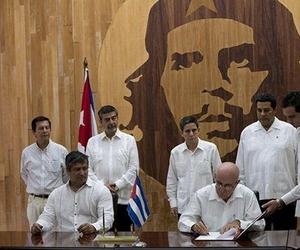Cuban and Chilean Business Executives Sign Contract on Nickel
- Submitted by: Juana
- Havana
- South America
- Business and Economy
- 04 / 05 / 2017

Cuban and Chilean business executives signed on Tuesday in Havana a contract of the International Economic Association to begin a feasible study on the extraction of iron and chromium in the area of Nicaro in the province of eastern Holguin.
Mario Cabello Marante, President of the Commercial Caribbean Nickel S.A. and Ronny Munoz Caceres of the Chilean RM Accessories and Consultants LTDA, signed the document at the headquarters of the Ministry of Energy and Mining.
The objective of this association is to elaborate a Technical-Economic Feasibility Study to learn the viability of extracting iron and chromium contents in the residuum left after extracting nickel and cobalt in Nicaro where the Comandante Rene Ramos Latour Nickel Company worked, said Cabello Marante in an exclusive interview with ACN.
He explained that it is a contract of risk where the foreign party contributes with financing the investigation and in case the outcome is positive then a joint venture would be created to construct the industrial installation and begin the process.
They are stored in an organized manner in outdoor deposits and a forestation program has been applied for years on its several square kilometers surface, said the Cuban expert.
This outdoor “warehouse” has 120 million tons of such residuum.
On the issue, Munoz Casares expressed his interest for the project with many possibilities; \ “it’s a good deal and we are convinced that the two year study will have positive results\”.
We must now look for the best technologies and this is our first business with CCN although we expect for much more, said the Chilean representative.
The Nicaro Nickel Company was the first processing nickel plant constructed in the country, nationalized by the Revolutionary government and later called Rene Ramos Latour (1932-1958).
Ramos Latour was Commander of the Rebel Army and head of the Action and Sabotage of the 26th of July Movement, known with his pseudonym of Daniel after the assassination of Frank Pais in July of 1957.
The construction of the town currently in Mayari municipality, Holguin province began in 1942 and by the end of 1943; the site achieved its first production according to historians.
However, in 2002 it was paralyzed due to the high level of obsolescence of its installations despite Cuba being among the top 10 nickel and cobalt producers in the world.
At the end of 1956, the construction began in the second nickel company this time close to the municipality of Moa whose investor was Freeport Sulphur Company, but was also nationalized because its US owners refused to pay its taxes.
The company was later named Commander Pedro Sotto Alba (1935-1958) in association with the Canadian Sherritt International Corporation.
In 1986, a new installation was put in place close to the town of Punta Gorda in Moa, with the name of Commander Ernesto Che Guevara who, as Minister of Industries promoted the beginning of the Pedro Sotto Alba after its owners left the country with all the technical documentation of the installation.
The minerals that the three plants have not used constitutes raw materials for the fabrication of iron mixed with nickel with estimated reserves for over 60 years of production.
Nickel is mainly used for the production of stainless steel and there are over 300 thousand of its application and special alloy. (acn)
Comments